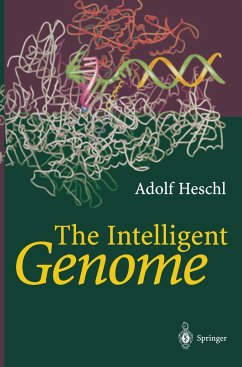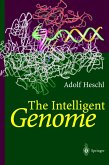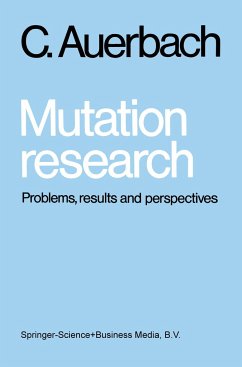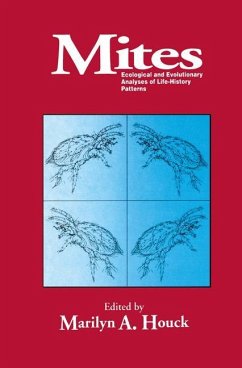Do our genes determine our behavior? Do humans occupy a unique position in evolution? To clarify these provoking questions, the author takes the reader on an ambitious and entertaining journey through a variety of scientific disciplines. In doing so, he creates an image of human evolution that argues that our entire individual knowledge is determined - to the smallest detail - by phylogeny. A provoking and controversial analysis of the theory of our inability to learn something new and of the extent to which our behavior is determined by our genes.
From the reviews:
"All knowledge of the individual is located in the genome, argues Heschl. With such a radicality he goes much further than many other researchers like Richard Dawkins, the advocate of the selfish gene."
Frankfurter Allgemeine, translated from issue June 17, 1998.
"We cannot exclude the possibility that Heschl is simply right."
Josef H. Reichholf, translated from "Psychologie heute" (July 1999)
"I basically agree with Heschl's theses."
Manfred Eigen, translated from a personal letter to the author (Nov. 1999)
"Written by a trained ethologist and genetic epistemologist, and translated from the 1998 German original, The Intelligent Genome highlights how little we know about the genetic determination of human behaviour. ... Although a very intense text, readers of this book may be drawn from various disciplines ... . A rich source of bibliography and widely drawn quotes from famous philosophers and scientists, thebook can also be a good research resource and reference book for any library collection." (Harjeet Khanna, Today's Life Science, Vol. 14 (5), 2002)
"Burying the myth of the human miracle, the author Adolf Heschl goes beyond any known theories. ... In a clear-cut scientific approach, Heschl claims that intelligence, although individually shaped throughout life, already pre-exists in the genome. ... The author analyses theories of scientists such as Darwin, Lamarck or Weisman, at the same time taking a highly critical look at his own point of view. Following the road of mankind, the reader is taken on both an ambitious and entertaining journey." (Science in Africa, March, 2002)
"All knowledge of the individual is located in the genome, argues Heschl. With such a radicality he goes much further than many other researchers like Richard Dawkins, the advocate of the selfish gene."
Frankfurter Allgemeine, translated from issue June 17, 1998.
"We cannot exclude the possibility that Heschl is simply right."
Josef H. Reichholf, translated from "Psychologie heute" (July 1999)
"I basically agree with Heschl's theses."
Manfred Eigen, translated from a personal letter to the author (Nov. 1999)
"Written by a trained ethologist and genetic epistemologist, and translated from the 1998 German original, The Intelligent Genome highlights how little we know about the genetic determination of human behaviour. ... Although a very intense text, readers of this book may be drawn from various disciplines ... . A rich source of bibliography and widely drawn quotes from famous philosophers and scientists, thebook can also be a good research resource and reference book for any library collection." (Harjeet Khanna, Today's Life Science, Vol. 14 (5), 2002)
"Burying the myth of the human miracle, the author Adolf Heschl goes beyond any known theories. ... In a clear-cut scientific approach, Heschl claims that intelligence, although individually shaped throughout life, already pre-exists in the genome. ... The author analyses theories of scientists such as Darwin, Lamarck or Weisman, at the same time taking a highly critical look at his own point of view. Following the road of mankind, the reader is taken on both an ambitious and entertaining journey." (Science in Africa, March, 2002)
Alles Wissen des Individuums steckt in dessen Genom, glaubt Heschl. Mit dieser Radikalität geht er weiter als viele andere Forscher wie Richard Dawkins der Verfechter vom egoistischen Gen. Viele Argumente regen zum Nachdenken an, nicht zuletzt, weil sie immer wieder zum Widerspruch herausfordern. Frankfurter Allgemeine Marktfrauen verwirklichen keinen Erkenntniszuwachs; Nobelpreisträger auch nicht. Nach den radikalen Hypothesen eines Biologen ist Wissensgewinn zufällig und von der genetischen Konstitution abhängig. Lukas Huber, Der Standard Ist nicht, wie Richard Dawkins, unbestreitbar ein Darwinist, einräumte, die Kultur das Besondere am Menschen? Iäßt Heschl fragen - und antwortet: "Nein und nochmals nein." Thomas Kramar, Die Presse Die Umwelt beeinflußt uns zwar, aber belehren kann sie uns nicht, ist Heschl überzeugt. Das letzte Wort beim Spiel der Evolution gibt er den Genen, so daß der Gültigkeitsbereich der Darwinschen Evolutionstheorie noch weitaus grundlegender sein soll als bislang angenommen. Claudia Metzger, bild der wissenschaft Nichts entkommt der Biologie, auch der menschliche Geist fällt nicht vom Himmel, sondern ist gänzlich durch das "intelligente Genom" vorprogrammiert. Das ist eine spannende These, die in ihren theoretischen Konsequenzen bislang noch von niemandem derart radikal verfolgt wurde. Florian Rötzer, Telepolis Vorsicht - das Buch ist keine lässige Bettlektüre. Die Aufmerksamkeit des Lesers ist gefordert, auch wenn schwierige Gedankengänge oft erstaunlich einleuchtend und klar dargestellt werden. Verband deutscher Biologen Die biologische Evolution funktioniert nach dem einfachen Prinzip der differentiellen Reproduktion: der unterschiedlichen Fortpflanzungsrate von Individuen. Das vorliegende Buch dokumentiert erstmals, dass - und vor allem warum - dieses einfache Prinzip ohne Wenn und Aber auch auf den Menschen anwendbar ist. Bioworld, Schweiz
All knowledge of the individual is located in the genome, argues Heschl. With such a radicality he goes much further than many other researchers like Richard Dawkins, the advocate of the selfish gene. Frankfurter Allgemeine, translated from issue June 17, 1998. "We cannot exclude the possibility that Heschl is simply right." Josef H. Reichholf, translated from "Psychologie heute" (July 1999) "I basically agree with Heschl's theses." Manfred Eigen, translated from a personal letter to the author (Nov. 1999).
All knowledge of the individual is located in the genome, argues Heschl. With such a radicality he goes much further than many other researchers like Richard Dawkins, the advocate of the selfish gene. Frankfurter Allgemeine, translated from issue June 17, 1998. "We cannot exclude the possibility that Heschl is simply right." Josef H. Reichholf, translated from "Psychologie heute" (July 1999) "I basically agree with Heschl's theses." Manfred Eigen, translated from a personal letter to the author (Nov. 1999).








